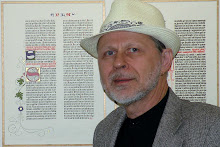22 February 2007
An Epistolary Novel by Nathan W. Everett
Synopsis
This is a new storyline that I am working on as a possible entry in NaNoWriMo in November of 2007. We'll see if it holds together as the time approaches.
Thomas Dowding is a devoted husband, patriot, and legal mastermind. He is the dependable and depended-upon assistant to Josiah Bartlet, Delegate to the Continental Congress from the colony of New Hampshire. As such, Thomas spends long periods of time in Philadelphia, away from his beloved wife, Ellen, and two children William and Mary, hoping to bring a declaration of freedom to the American people. During these absences, Thomas writes lengthy love letters to his beloved, chronicling, as well, his endeavors on behalf of the honorable men of the Congress.
Through Thomas and Ellen’s letters to each other, we see emerge a portrait of life in colonial America and the struggle for freedom. They have sacrificed their home life for the dream of an independent nation.
But Thomas is a conflicted man. In truth, he doubts the motives of those passionately arguing for independence. He doubts that the colonies will win the war with their mother England. “What child,” he asks, “ever wins a battle with its mother? We are disciplined to obey and honor her. And should the child succeed, what then should we think of it but that it has ill-treated its family?” Thomas doubts the faith in which he was raised, and even his love for his wife from whom he is so long absent.. He is, as he once jestingly suggests, a true Doubting Thomas.
But these things are never written to his wife. Thomas becomes acquainted with a servant, or serving girl, Jane, whom, through a mixture of circumstances, he assumes is deaf. She, for reasons of her own, declines to disabuse him of this notion. Operating under the assumption that she cannot hear what he is saying, he begins to unburden his soul to Jane. The Thomas that emerges through the letters of Jane to her cousin, Diane, in Maryland is a portrait of a frightened and soulful man with whom she falls hopelessly in love.
Through the letters of these three, and occasional missives from peripheral characters, the story congeals at the point when Thomas must show by action where his loyalties lie and what he really believe in. In one climactic event, related by each of the three principals, he must choose between wife and servant, England and America, heaven and hell. In that choice may lie the success or failure of The American Revolution.

1 comments:
Oh, interesting!
Questions on names: was Josiah Bartlet a real guy? I, naturally, can't really dissociate that name anymore from the West Wing character. If he was a real continental congressman, then that's cool, but you might want to pick someone else if you don't want the West Wing connotations.
William and Mary: named after _that_ William and Mary? As in, the College of? Not that there's anything wrong with those names, it's just that to see them paired like that again brings up associations that you'll want to consider.
> “What child,” he asks, “ever wins a battle with its mother?”
Her answer, if she is wise, will be "Eventually, my love, every one of them."
> the story congeals at the point when Thomas must show by action where his loyalties lie and what he really believe in. In one climactic event, related by each of the three principals, he must choose between wife and servant, England and America, heaven and hell. In that choice may lie the success or failure of The American Revolution.
I just love that. That's great. That totally makes me want to read the book, and should absolutely go on the back cover.
Ok, so now I hope you'll write this one next instead of another Deb Riley novel. :)
Post a Comment